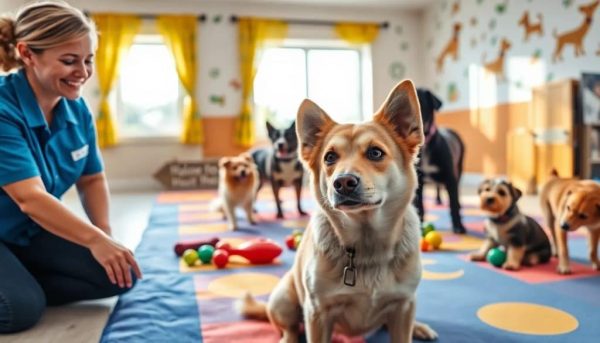Doggy daycare has become a popular solution for many dog owners looking to provide their pets with socialization and an escape from boredom. However, it's crucial to assess whether your dog truly enjoys this environment.
In this article, we will explore the factors to consider if your furry friend doesn’t seem to thrive in daycare and what steps you can take to enhance their experience.
When is day care bad for your dog?
Not all dogs adapt well to daycare situations. Some may show signs of distress that can be detrimental to their mental health. Identifying early warning signs is essential for ensuring your dog's well-being.
Stressful environments can lead to behavioral issues, including increased anxiety and aggression. It’s important to recognize the signs indicating that daycare might not be suitable for your dog.
Common indicators include excessive barking, reluctance to enter the facility, or even physical signs like drooling and shaking. Always monitor your dog's body language closely to determine how they are feeling.
What do you do if your dog doesn’t enjoy day care?
If you've noticed that your dog is not enjoying daycare, the first step is to communicate with the daycare staff. They can provide insights into your dog’s behavior throughout the day.
It's also essential to assess your dog’s individual needs. Some dogs thrive in social settings, while others may require more specialized attention. Consider alternatives to traditional daycare if your dog shows signs of anxiety or stress.
- Evaluate your dog's behavior during playtime.
- Look for signs of stress or discomfort.
- Discuss your observations with the daycare staff.
- Explore individualized care options.
Why isn’t my dog a good fit for doggy daycare?
Several factors can influence whether or not your dog is suited for daycare. For example, age, temperament, and past experiences play significant roles in this decision.

Young dogs or those that are naturally social may adapt more easily, while older or shy dogs may find the environment overwhelming. Understanding your dog’s personality is crucial in determining their fit for daycare.
Additionally, not all daycare facilities are equipped to handle dogs with special needs or anxiety issues. Look for places with trained staff who understand canine behavior and can provide appropriate care.
Is daycare right for your dog?
Choosing daycare for your dog requires careful consideration. Assess your dog's social skills and past interactions with other dogs to determine if this setting will be beneficial.
Ask yourself questions like: Does my dog enjoy being around other dogs? Does he or she display signs of anxiety when in new situations? Answering these questions can help you decide.
- Consider your dog's energy levels and socialization needs.
- Research daycares with good reviews and trained staff.
- Visit and observe how your dog interacts with other pets and the environment.
What are some signs that your dog isn’t enjoying daycare?
Recognizing signs your dog is unhappy in daycare is essential for ensuring their happiness and well-being. Some dogs may not express discomfort openly, so vigilant observation is necessary.
Look for behavioral changes such as refusal to enter the facility, hiding, or excessive barking. These could indicate that your dog is feeling stressed or overwhelmed.
Physical symptoms such as increased heart rate or panting can also be signs of anxiety. If these behaviors persist, it may be time to reconsider your daycare options.
How can you advocate for your dog in daycare?
Advocating for your dog in daycare is vital to ensuring they receive the care they need. Open communication with the staff about your dog's specific needs is a key component.

Provide clear information about your dog's behavior, preferences, and any anxiety triggers. This will empower daycare staff to make adjustments that foster a more comfortable environment.
Regular check-ins with the daycare can also help you stay informed about your dog’s progress and any changes in behavior that may occur.
What alternatives exist if daycare isn’t right for your dog?
If you find that daycare is not the best fit for your dog, there are several alternatives to consider. Individual activities tailored to your dog's preferences can provide ample stimulation without the stress of a group setting.
Consider engaging a dog walker or enrolling your dog in specialized training classes that focus on their needs. These alternatives can offer socialization in a less overwhelming environment.
- Hire a dog trainer for personalized sessions.
- Look into dog walking services for one-on-one attention.
- Explore dog-friendly activities such as agility training or swimming.
Related questions about dog daycare experiences
What if my dog doesn't like daycare?
If your dog is resistant to daycare, it’s crucial to analyze their behavior. Some dogs simply do not adapt well to group settings and may benefit from alternative arrangements. Consider individual care options that align with their temperament and needs.
Building a routine that prioritizes your dog's comfort and preferences can lead to a happier and healthier canine. Don't hesitate to take proactive steps to ensure your dog feels secure and content.
Do some dogs not like doggy daycare?
Yes, some dogs do not thrive in daycare environments. Factors such as personality, previous socialization experiences, and anxiety levels play significant roles in their adaptability. Understanding your dog's unique traits will guide you in making the right choice.
Dogs that have had negative experiences or lack social exposure may find daycare to be overwhelming. It's essential to consider alternatives that offer low-stress environments for these dogs.

Is dog daycare stressful for dogs?
Dog daycare can be stressful, especially for dogs that are not used to being in a group setting. High noise levels, unfamiliar dogs, and a fast-paced environment can contribute to anxiety.
Observing your dog's body language is vital to understanding their emotional state. If you notice signs of distress, reevaluating your daycare choice is crucial to ensuring your dog's well-being.
Will my dog get used to daycare?
Some dogs may eventually acclimate to daycare with gradual exposure and positive experiences. Patience and consistency are key in helping them adjust, but it’s important to recognize that not all dogs will adapt.
Monitoring their behavior consistently will help you determine if they are genuinely becoming comfortable. If not, it may be time to explore other options that better align with your dog’s needs.





Leave a Reply